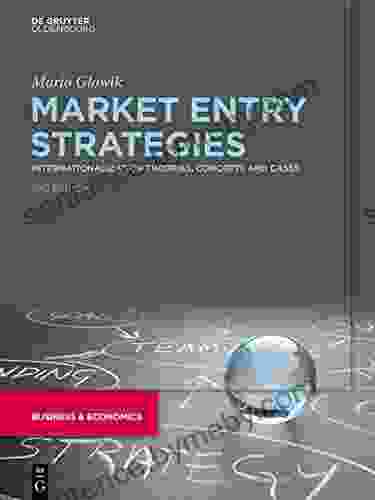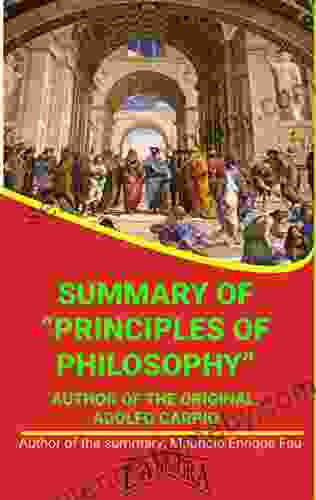Summary of Principles of Philosophy by Adolfo Carpio

5 out of 5
| Language | : | English |
| File size | : | 2515 KB |
| Text-to-Speech | : | Enabled |
| Screen Reader | : | Supported |
| Enhanced typesetting | : | Enabled |
| Word Wise | : | Enabled |
| Print length | : | 7 pages |
| Lending | : | Enabled |
Adolfo Carpio's Principles of Philosophy is a comprehensive and rigorous to the major branches of philosophy. The book is divided into eight parts, each of which covers a different area of philosophy: metaphysics, epistemology, ethics, aesthetics, logic, political philosophy, and the philosophy of religion.
Carpio's writing is clear and concise, and he does an excellent job of explaining complex philosophical concepts in a way that is accessible to students. The book is also well-organized, with each chapter building on the material covered in the previous chapters.
Principles of Philosophy is an essential textbook for any student of philosophy. It is a valuable resource for anyone who wants to learn more about the major philosophical traditions and the key philosophical questions that have been debated for centuries.
Metaphysics
Metaphysics is the study of the fundamental nature of reality. It seeks to answer questions about what exists, what it is like, and how it is related.
Carpio's discussion of metaphysics begins with a consideration of the different ways that philosophers have defined reality. He then goes on to discuss the major metaphysical theories, such as materialism, idealism, and dualism.
Carpio also discusses the relationship between metaphysics and science. He argues that metaphysics is not a science, but rather a way of thinking about the world that is complementary to science.
Epistemology
Epistemology is the study of knowledge. It seeks to answer questions about what knowledge is, how we acquire it, and how we can be certain of it.
Carpio's discussion of epistemology begins with a consideration of the different ways that philosophers have defined knowledge. He then goes on to discuss the major epistemological theories, such as empiricism, rationalism, and skepticism.
Carpio also discusses the relationship between epistemology and metaphysics. He argues that epistemology is dependent on metaphysics, since our understanding of knowledge is shaped by our understanding of reality.
Ethics
Ethics is the study of morality. It seeks to answer questions about what is right and wrong, and how we should live our lives.
Carpio's discussion of ethics begins with a consideration of the different ways that philosophers have defined morality. He then goes on to discuss the major ethical theories, such as utilitarianism, deontology, and virtue ethics.
Carpio also discusses the relationship between ethics and other branches of philosophy, such as metaphysics and epistemology. He argues that ethics is a practical discipline that is informed by our understanding of the world and our knowledge.
Aesthetics
Aesthetics is the study of beauty and art. It seeks to answer questions about what makes something beautiful, and how we can appreciate it.
Carpio's discussion of aesthetics begins with a consideration of the different ways that philosophers have defined beauty. He then goes on to discuss the major aesthetic theories, such as formalism, expressionism, and instrumentalism.
Carpio also discusses the relationship between aesthetics and other branches of philosophy, such as ethics and metaphysics. He argues that aesthetics is a unique discipline that is concerned with the experience of beauty.
Logic
Logic is the study of reasoning. It seeks to answer questions about what makes an argument valid, and how we can use logic to evaluate arguments.
Carpio's discussion of logic begins with a consideration of the different types of arguments. He then goes on to discuss the major logical fallacies, and how to avoid them.
Carpio also discusses the relationship between logic and other branches of philosophy, such as metaphysics and epistemology. He argues that logic is a foundation
5 out of 5
| Language | : | English |
| File size | : | 2515 KB |
| Text-to-Speech | : | Enabled |
| Screen Reader | : | Supported |
| Enhanced typesetting | : | Enabled |
| Word Wise | : | Enabled |
| Print length | : | 7 pages |
| Lending | : | Enabled |
Do you want to contribute by writing guest posts on this blog?
Please contact us and send us a resume of previous articles that you have written.
 Book
Book Novel
Novel Page
Page Chapter
Chapter Text
Text Story
Story Genre
Genre Reader
Reader Library
Library Paperback
Paperback E-book
E-book Magazine
Magazine Newspaper
Newspaper Paragraph
Paragraph Sentence
Sentence Bookmark
Bookmark Shelf
Shelf Glossary
Glossary Bibliography
Bibliography Foreword
Foreword Preface
Preface Synopsis
Synopsis Annotation
Annotation Footnote
Footnote Manuscript
Manuscript Scroll
Scroll Codex
Codex Tome
Tome Bestseller
Bestseller Classics
Classics Library card
Library card Narrative
Narrative Biography
Biography Autobiography
Autobiography Memoir
Memoir Reference
Reference Encyclopedia
Encyclopedia Kenneth Pomeranz
Kenneth Pomeranz Jane Nelsen
Jane Nelsen Janice A Maville
Janice A Maville Jason Elliot
Jason Elliot Michael Hulse
Michael Hulse William Mitchell
William Mitchell Thomas S Hischak
Thomas S Hischak Hasbro
Hasbro Stephen Brennan
Stephen Brennan L T Ryan
L T Ryan Lehman Engel
Lehman Engel James P Owen
James P Owen Jay Annelli
Jay Annelli Walter Beede
Walter Beede Kelly Parker
Kelly Parker James Patterson
James Patterson Javed Jabbar
Javed Jabbar Jasper T Scott
Jasper T Scott James Lovelock
James Lovelock Jason Sandberg
Jason Sandberg
Light bulbAdvertise smarter! Our strategic ad space ensures maximum exposure. Reserve your spot today!

 Jeffrey Hayes850 Quick, Easy, and Delicious High Fat, Low Carb Southern Recipes for the...
Jeffrey Hayes850 Quick, Easy, and Delicious High Fat, Low Carb Southern Recipes for the... Jules VerneFollow ·5.6k
Jules VerneFollow ·5.6k Thomas PynchonFollow ·9.7k
Thomas PynchonFollow ·9.7k Elmer PowellFollow ·10.5k
Elmer PowellFollow ·10.5k Herman MelvilleFollow ·8.9k
Herman MelvilleFollow ·8.9k Stan WardFollow ·7.6k
Stan WardFollow ·7.6k Luke BlairFollow ·9.4k
Luke BlairFollow ·9.4k John KeatsFollow ·15.6k
John KeatsFollow ·15.6k Earl WilliamsFollow ·18.3k
Earl WilliamsFollow ·18.3k

 Franklin Bell
Franklin BellHow Businesses Can Thrive In The New Global Neighborhoods
The world is becoming...

 Rob Foster
Rob FosterCard Manipulations Volume 1: A Masterclass in Deception...
Unveiling the...

 Enrique Blair
Enrique BlairUnveil the Secrets of Card Manipulation: Dive into "More...
Step into the captivating world...

 Jamal Blair
Jamal BlairComedy Fillers 200 Quips One Liners Jean Hugard
Unlock the Secrets of...

 Chase Simmons
Chase SimmonsUnlock Financial Independence: A Comprehensive Guide to...
In a world where financial security seems...

 Dion Reed
Dion ReedUnveiling Global Market Entry Strategies: A Comprehensive...
Global Market Entry Strategies:...
5 out of 5
| Language | : | English |
| File size | : | 2515 KB |
| Text-to-Speech | : | Enabled |
| Screen Reader | : | Supported |
| Enhanced typesetting | : | Enabled |
| Word Wise | : | Enabled |
| Print length | : | 7 pages |
| Lending | : | Enabled |










